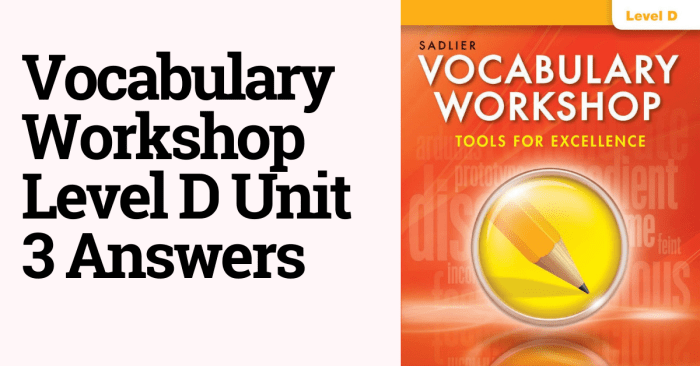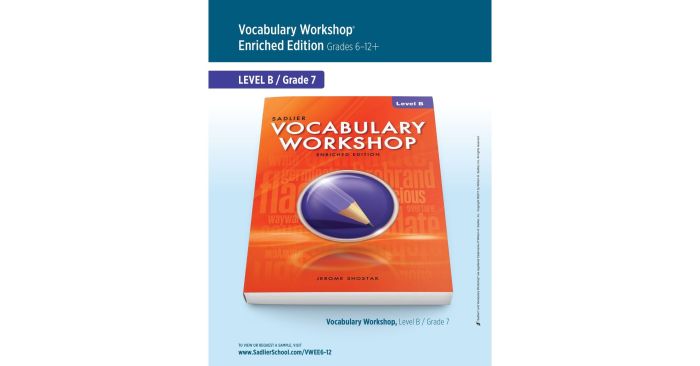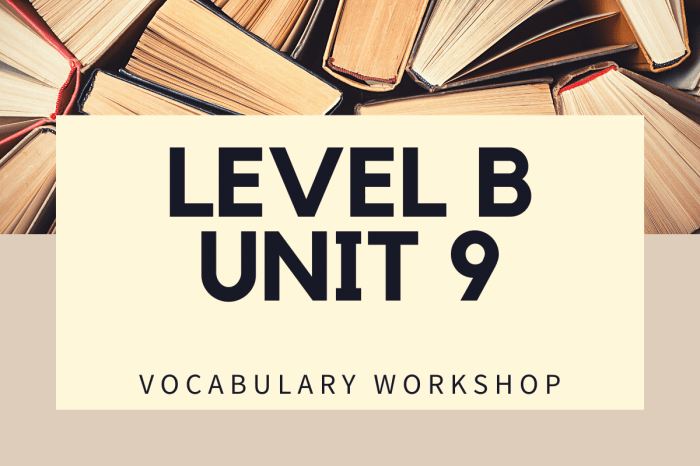Embark on an enlightening journey with Vocabulary Workshop Unit 3 Answers Level B, a comprehensive guide designed to empower you with effective vocabulary acquisition techniques, contextual understanding, and practical word usage strategies. Immerse yourself in a world of words, unlocking their meanings and unlocking your potential as a proficient communicator.
Through engaging exercises and insightful explanations, this resource will equip you with the tools to expand your vocabulary, enhance your word retention, and master the nuances of word usage in various contexts. Delve into the fascinating realm of etymology, exploring the origins and historical evolution of words, and discover the power of vocabulary development in shaping your thoughts and communication.
Vocabulary Acquisition Techniques: Vocabulary Workshop Unit 3 Answers Level B

Vocabulary acquisition is a fundamental skill for effective communication and academic success. There are several proven techniques to expand vocabulary and improve word retention. One effective method is reading widely and actively engaging with texts. Reading exposes individuals to a variety of words in different contexts, facilitating their comprehension and retention.
Another technique involves intentional vocabulary study, such as using flashcards, word lists, or vocabulary apps. Repetition and regular practice are crucial for solidifying new words in memory. Additionally, engaging in conversations and discussions with others provides opportunities to use and reinforce vocabulary.
Contextual Understanding, Vocabulary workshop unit 3 answers level b
Context clues play a vital role in inferring the meaning of unfamiliar words. By examining the surrounding words, phrases, and sentences, readers can make educated guesses about the meaning of unknown terms. Understanding word relationships, such as synonyms, antonyms, and homonyms, further enhances contextual comprehension.
Exercises involving context-based vocabulary acquisition, such as cloze tests or fill-in-the-blank activities, can strengthen this skill.
Word Usage and Application
Effective vocabulary usage involves understanding the nuances of words in different contexts. Words can have multiple meanings depending on the situation, and choosing the appropriate word is essential for clear and precise communication. Synonyms, antonyms, and homonyms offer opportunities to explore the subtle differences in word usage.
Examples of using words effectively can be found in literature, speeches, and everyday conversations.
Word Analysis and Etymology
Word analysis involves examining the structure of words, including prefixes, suffixes, and roots. Understanding these components can provide insights into the meaning and origin of words. Etymology, the study of word origins, traces the historical evolution of words, revealing their connections to other languages and cultures.
Activities exploring word etymology can foster a deeper appreciation for the richness and complexity of language.
Vocabulary in Practice
To reinforce vocabulary skills, a variety of exercises and activities can be employed. Vocabulary quizzes or games can assess understanding and encourage retention. Discussions or debates on the importance of vocabulary development can stimulate critical thinking and reinforce the value of expanding one’s vocabulary.
Additionally, creating a vocabulary journal or maintaining a word bank can provide a record of newly acquired words and their meanings.
General Inquiries
What are the key techniques for effective vocabulary acquisition?
Vocabulary Workshop Unit 3 Answers Level B emphasizes active engagement with words through reading, flashcards, spaced repetition, and interactive exercises.
How can I improve my word retention?
The guide provides strategies such as spaced repetition, mnemonics, and context-based learning to enhance word retention.
What are the nuances of word usage in different contexts?
Vocabulary Workshop Unit 3 Answers Level B explores the subtle differences in word meanings and usage depending on context, including formal and informal settings.

